University Leadership and Management: Jetty Building Reflection Report
VerifiedAdded on 2021/04/19
|12
|2976
|23
Report
AI Summary
This report provides a critical self-reflection on a leadership and teamwork exercise undertaken during a university residential tour, specifically the task of building a jetty. The student analyzes their experience using the Gibbs reflective cycle, exploring the feelings, evaluation, and analysis of the challenges faced. The report highlights issues such as lack of effective leadership, poor communication, and the absence of clear roles within the team, leading to disagreements and inefficiency. The student evaluates their own leadership skills, identifying areas for improvement in team management and application of leadership principles. The conclusion emphasizes the importance of effective communication, establishing team rules, and clarity of purpose. The report concludes with an action plan, outlining steps the student intends to take to enhance their leadership capabilities and improve future teamwork performance.
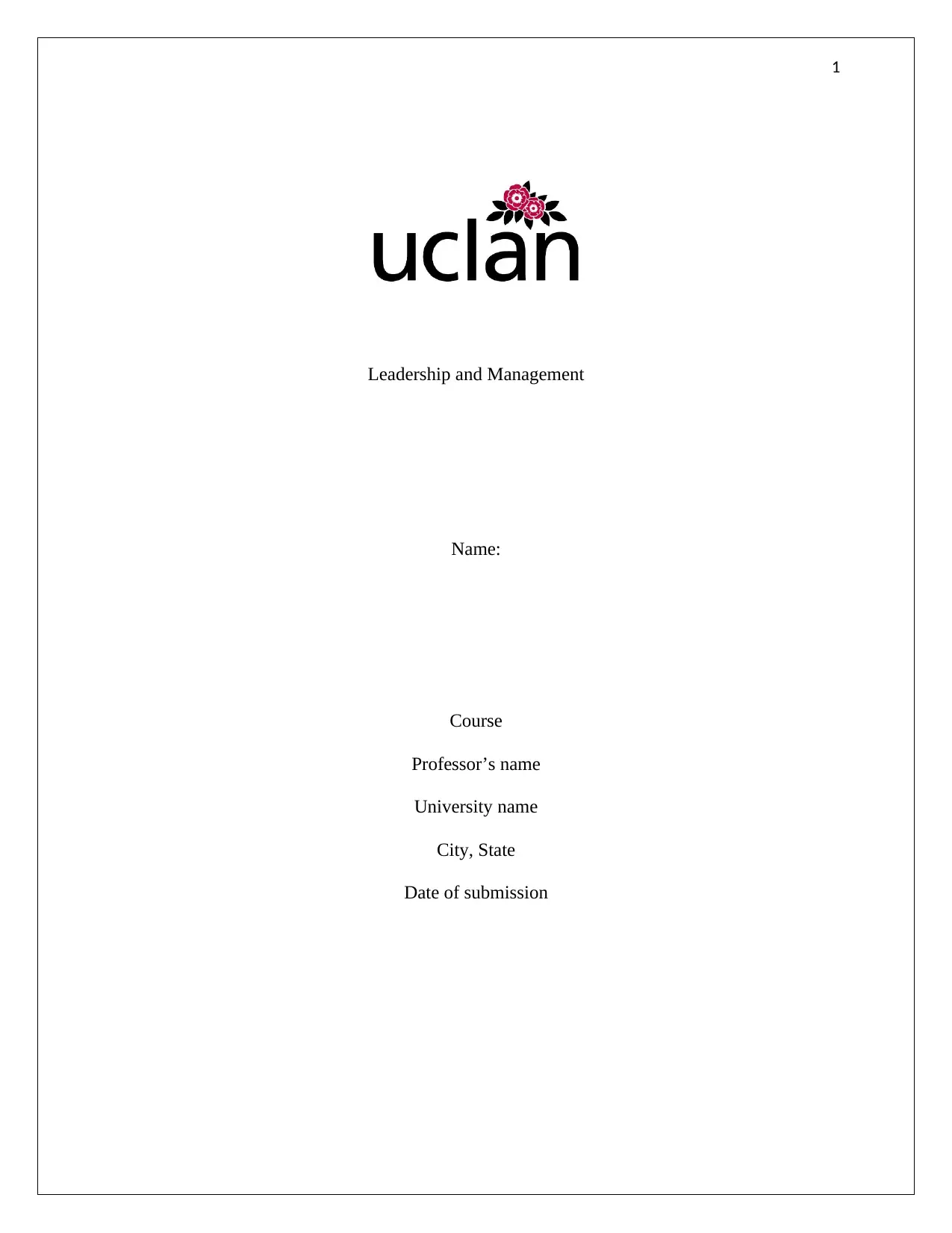
1
Leadership and Management
Name:
Course
Professor’s name
University name
City, State
Date of submission
Leadership and Management
Name:
Course
Professor’s name
University name
City, State
Date of submission
Paraphrase This Document
Need a fresh take? Get an instant paraphrase of this document with our AI Paraphraser

2
Table of Contents
1.0 Introduction................................................................................................................................3
2.0 Analysis.....................................................................................................................................3
3.0 Conclusion.................................................................................................................................9
4.0 References................................................................................................................................11
Table of Contents
1.0 Introduction................................................................................................................................3
2.0 Analysis.....................................................................................................................................3
3.0 Conclusion.................................................................................................................................9
4.0 References................................................................................................................................11
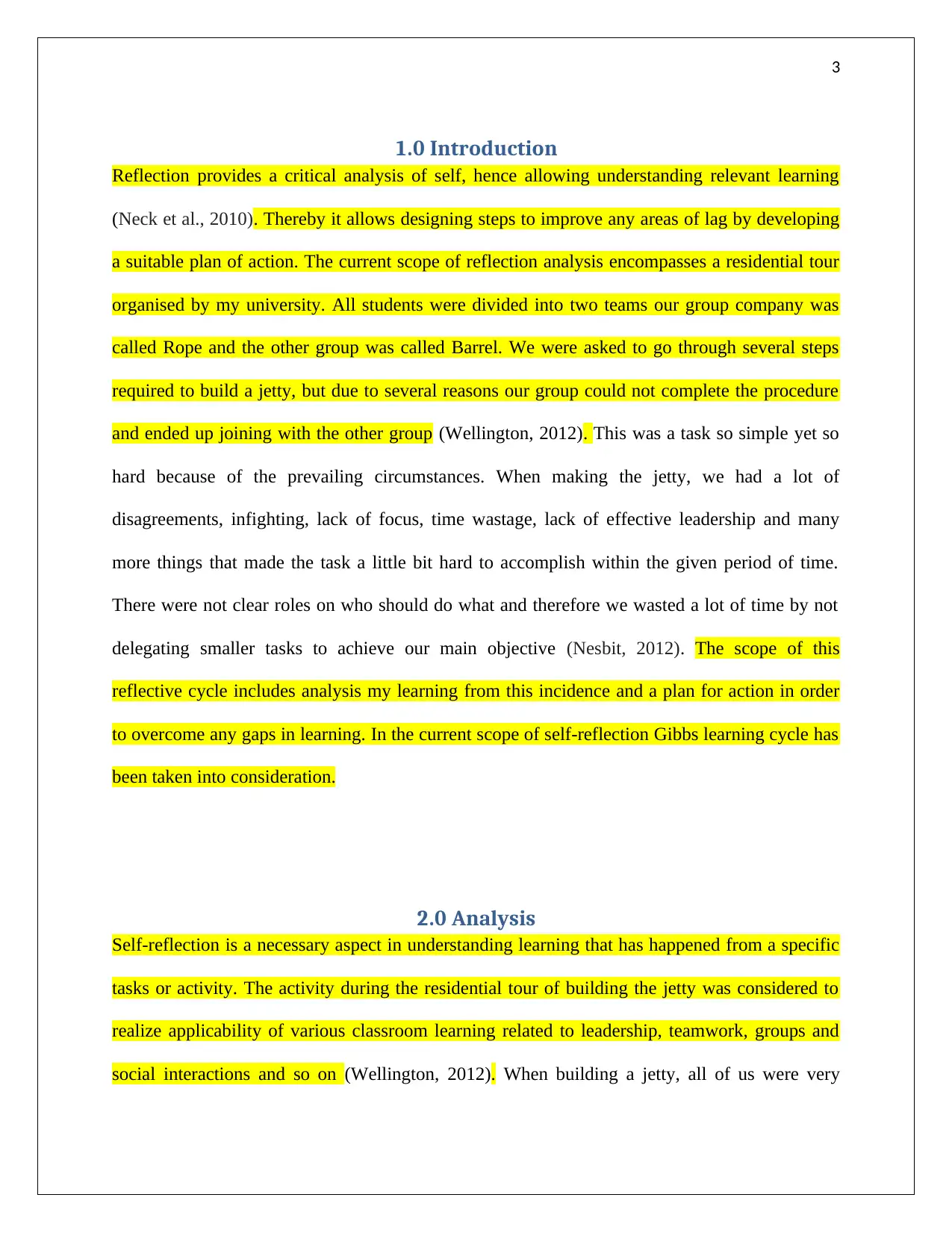
3
1.0 Introduction
Reflection provides a critical analysis of self, hence allowing understanding relevant learning
(Neck et al., 2010). Thereby it allows designing steps to improve any areas of lag by developing
a suitable plan of action. The current scope of reflection analysis encompasses a residential tour
organised by my university. All students were divided into two teams our group company was
called Rope and the other group was called Barrel. We were asked to go through several steps
required to build a jetty, but due to several reasons our group could not complete the procedure
and ended up joining with the other group (Wellington, 2012). This was a task so simple yet so
hard because of the prevailing circumstances. When making the jetty, we had a lot of
disagreements, infighting, lack of focus, time wastage, lack of effective leadership and many
more things that made the task a little bit hard to accomplish within the given period of time.
There were not clear roles on who should do what and therefore we wasted a lot of time by not
delegating smaller tasks to achieve our main objective (Nesbit, 2012). The scope of this
reflective cycle includes analysis my learning from this incidence and a plan for action in order
to overcome any gaps in learning. In the current scope of self-reflection Gibbs learning cycle has
been taken into consideration.
2.0 Analysis
Self-reflection is a necessary aspect in understanding learning that has happened from a specific
tasks or activity. The activity during the residential tour of building the jetty was considered to
realize applicability of various classroom learning related to leadership, teamwork, groups and
social interactions and so on (Wellington, 2012). When building a jetty, all of us were very
1.0 Introduction
Reflection provides a critical analysis of self, hence allowing understanding relevant learning
(Neck et al., 2010). Thereby it allows designing steps to improve any areas of lag by developing
a suitable plan of action. The current scope of reflection analysis encompasses a residential tour
organised by my university. All students were divided into two teams our group company was
called Rope and the other group was called Barrel. We were asked to go through several steps
required to build a jetty, but due to several reasons our group could not complete the procedure
and ended up joining with the other group (Wellington, 2012). This was a task so simple yet so
hard because of the prevailing circumstances. When making the jetty, we had a lot of
disagreements, infighting, lack of focus, time wastage, lack of effective leadership and many
more things that made the task a little bit hard to accomplish within the given period of time.
There were not clear roles on who should do what and therefore we wasted a lot of time by not
delegating smaller tasks to achieve our main objective (Nesbit, 2012). The scope of this
reflective cycle includes analysis my learning from this incidence and a plan for action in order
to overcome any gaps in learning. In the current scope of self-reflection Gibbs learning cycle has
been taken into consideration.
2.0 Analysis
Self-reflection is a necessary aspect in understanding learning that has happened from a specific
tasks or activity. The activity during the residential tour of building the jetty was considered to
realize applicability of various classroom learning related to leadership, teamwork, groups and
social interactions and so on (Wellington, 2012). When building a jetty, all of us were very
⊘ This is a preview!⊘
Do you want full access?
Subscribe today to unlock all pages.

Trusted by 1+ million students worldwide
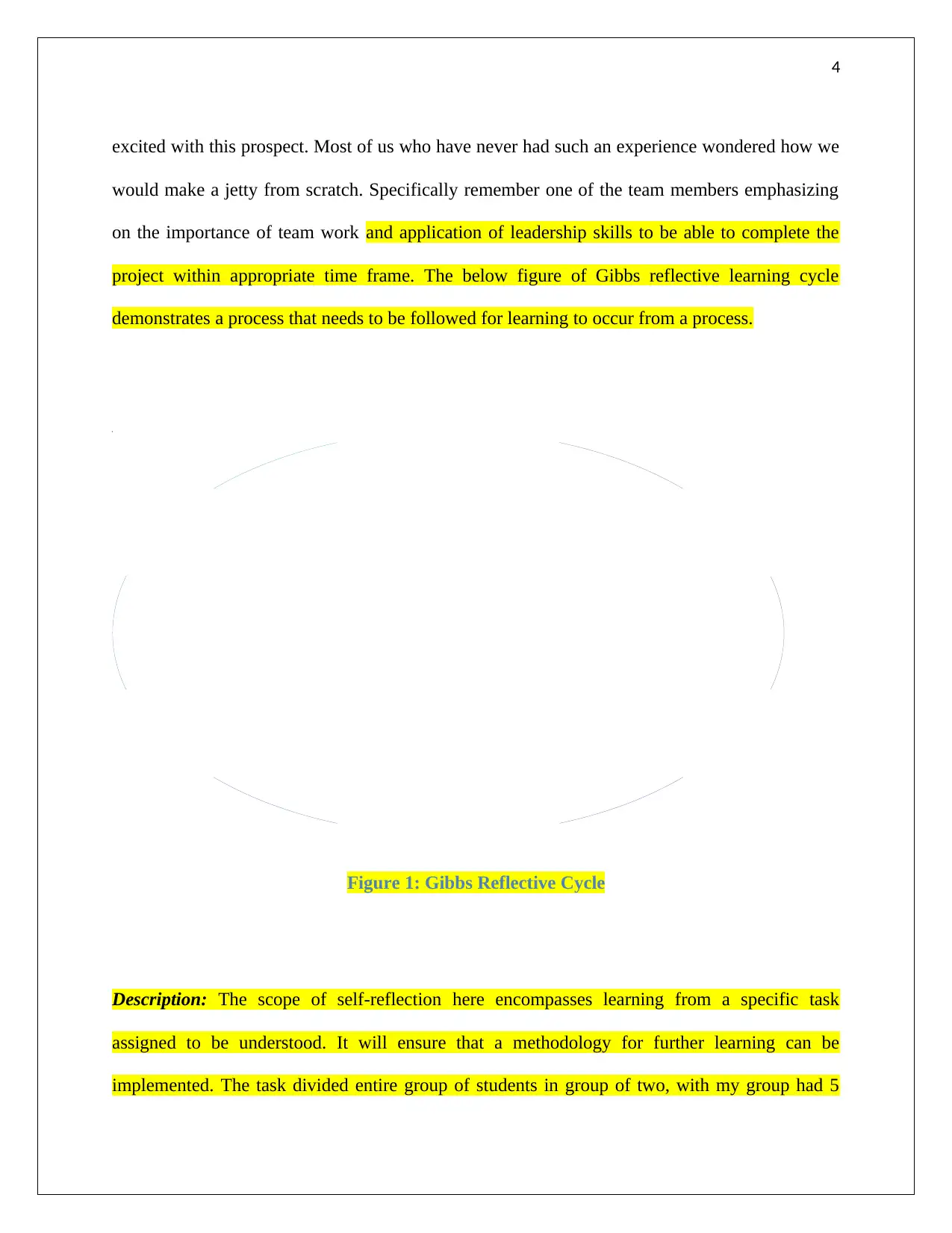
4
excited with this prospect. Most of us who have never had such an experience wondered how we
would make a jetty from scratch. Specifically remember one of the team members emphasizing
on the importance of team work and application of leadership skills to be able to complete the
project within appropriate time frame. The below figure of Gibbs reflective learning cycle
demonstrates a process that needs to be followed for learning to occur from a process.
Figure 1: Gibbs Reflective Cycle
Description: The scope of self-reflection here encompasses learning from a specific task
assigned to be understood. It will ensure that a methodology for further learning can be
implemented. The task divided entire group of students in group of two, with my group had 5
DescriptionFeelingsEvaluationAnalysisConclusionActionPlan
excited with this prospect. Most of us who have never had such an experience wondered how we
would make a jetty from scratch. Specifically remember one of the team members emphasizing
on the importance of team work and application of leadership skills to be able to complete the
project within appropriate time frame. The below figure of Gibbs reflective learning cycle
demonstrates a process that needs to be followed for learning to occur from a process.
Figure 1: Gibbs Reflective Cycle
Description: The scope of self-reflection here encompasses learning from a specific task
assigned to be understood. It will ensure that a methodology for further learning can be
implemented. The task divided entire group of students in group of two, with my group had 5
DescriptionFeelingsEvaluationAnalysisConclusionActionPlan
Paraphrase This Document
Need a fresh take? Get an instant paraphrase of this document with our AI Paraphraser
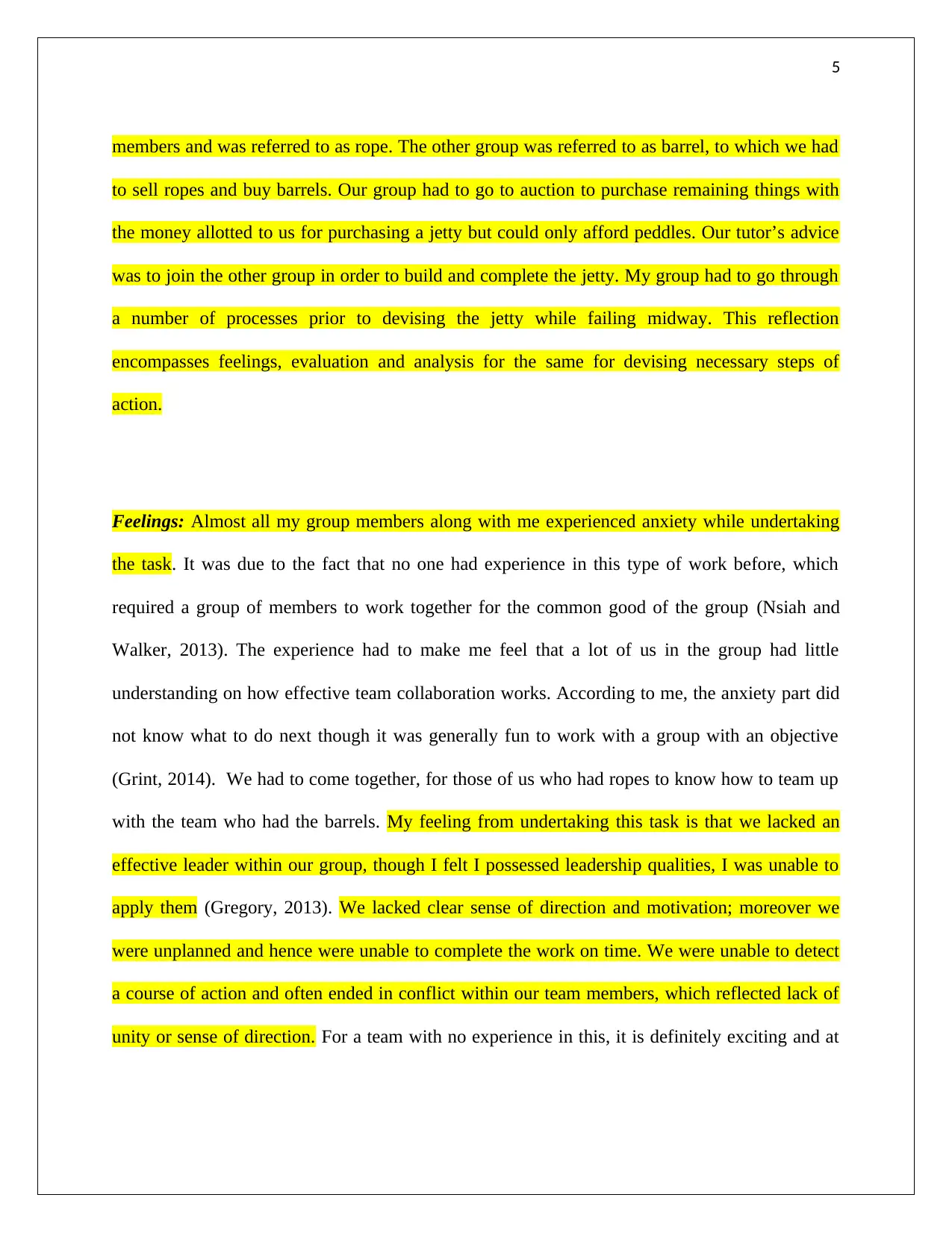
5
members and was referred to as rope. The other group was referred to as barrel, to which we had
to sell ropes and buy barrels. Our group had to go to auction to purchase remaining things with
the money allotted to us for purchasing a jetty but could only afford peddles. Our tutor’s advice
was to join the other group in order to build and complete the jetty. My group had to go through
a number of processes prior to devising the jetty while failing midway. This reflection
encompasses feelings, evaluation and analysis for the same for devising necessary steps of
action.
Feelings: Almost all my group members along with me experienced anxiety while undertaking
the task. It was due to the fact that no one had experience in this type of work before, which
required a group of members to work together for the common good of the group (Nsiah and
Walker, 2013). The experience had to make me feel that a lot of us in the group had little
understanding on how effective team collaboration works. According to me, the anxiety part did
not know what to do next though it was generally fun to work with a group with an objective
(Grint, 2014). We had to come together, for those of us who had ropes to know how to team up
with the team who had the barrels. My feeling from undertaking this task is that we lacked an
effective leader within our group, though I felt I possessed leadership qualities, I was unable to
apply them (Gregory, 2013). We lacked clear sense of direction and motivation; moreover we
were unplanned and hence were unable to complete the work on time. We were unable to detect
a course of action and often ended in conflict within our team members, which reflected lack of
unity or sense of direction. For a team with no experience in this, it is definitely exciting and at
members and was referred to as rope. The other group was referred to as barrel, to which we had
to sell ropes and buy barrels. Our group had to go to auction to purchase remaining things with
the money allotted to us for purchasing a jetty but could only afford peddles. Our tutor’s advice
was to join the other group in order to build and complete the jetty. My group had to go through
a number of processes prior to devising the jetty while failing midway. This reflection
encompasses feelings, evaluation and analysis for the same for devising necessary steps of
action.
Feelings: Almost all my group members along with me experienced anxiety while undertaking
the task. It was due to the fact that no one had experience in this type of work before, which
required a group of members to work together for the common good of the group (Nsiah and
Walker, 2013). The experience had to make me feel that a lot of us in the group had little
understanding on how effective team collaboration works. According to me, the anxiety part did
not know what to do next though it was generally fun to work with a group with an objective
(Grint, 2014). We had to come together, for those of us who had ropes to know how to team up
with the team who had the barrels. My feeling from undertaking this task is that we lacked an
effective leader within our group, though I felt I possessed leadership qualities, I was unable to
apply them (Gregory, 2013). We lacked clear sense of direction and motivation; moreover we
were unplanned and hence were unable to complete the work on time. We were unable to detect
a course of action and often ended in conflict within our team members, which reflected lack of
unity or sense of direction. For a team with no experience in this, it is definitely exciting and at
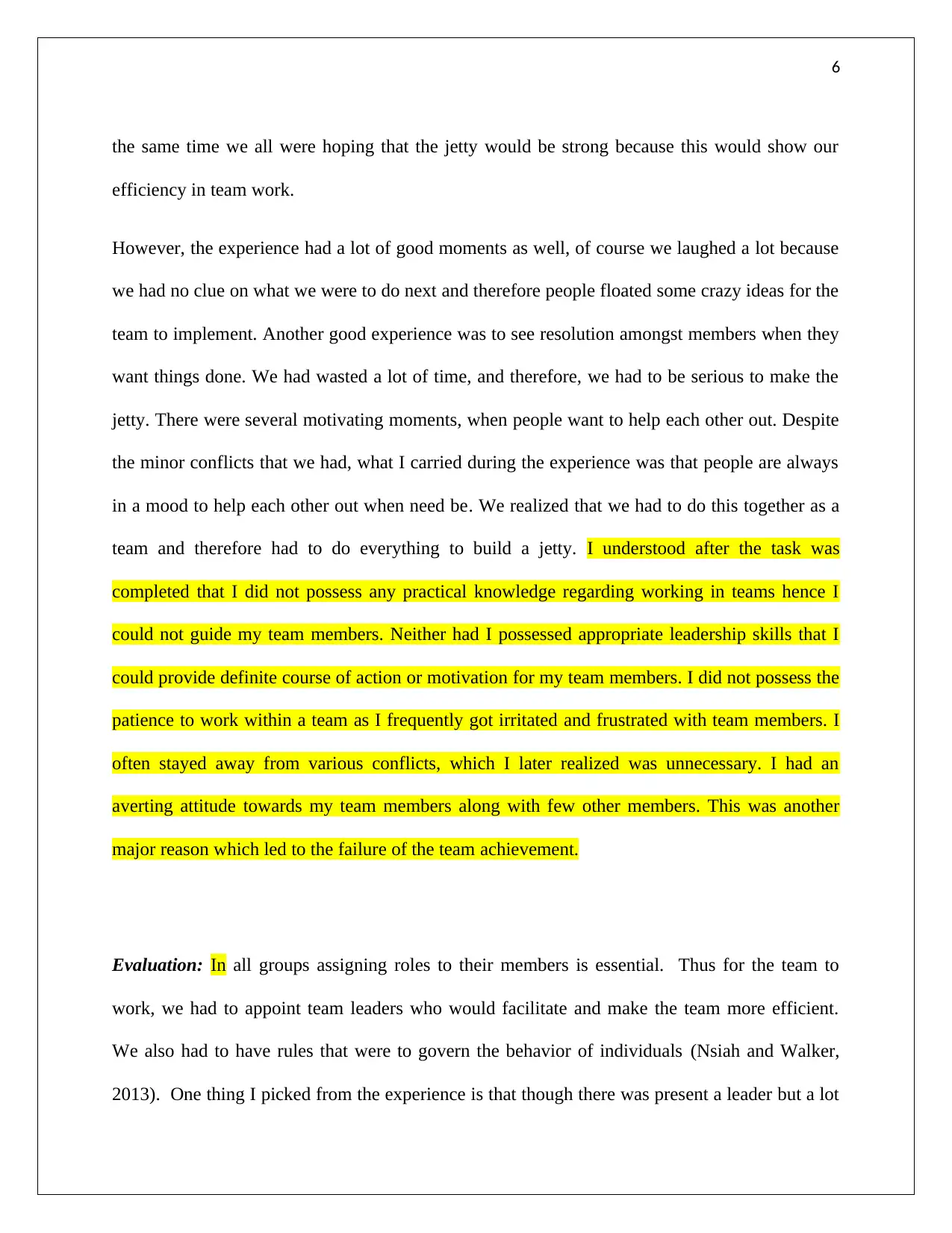
6
the same time we all were hoping that the jetty would be strong because this would show our
efficiency in team work.
However, the experience had a lot of good moments as well, of course we laughed a lot because
we had no clue on what we were to do next and therefore people floated some crazy ideas for the
team to implement. Another good experience was to see resolution amongst members when they
want things done. We had wasted a lot of time, and therefore, we had to be serious to make the
jetty. There were several motivating moments, when people want to help each other out. Despite
the minor conflicts that we had, what I carried during the experience was that people are always
in a mood to help each other out when need be. We realized that we had to do this together as a
team and therefore had to do everything to build a jetty. I understood after the task was
completed that I did not possess any practical knowledge regarding working in teams hence I
could not guide my team members. Neither had I possessed appropriate leadership skills that I
could provide definite course of action or motivation for my team members. I did not possess the
patience to work within a team as I frequently got irritated and frustrated with team members. I
often stayed away from various conflicts, which I later realized was unnecessary. I had an
averting attitude towards my team members along with few other members. This was another
major reason which led to the failure of the team achievement.
Evaluation: In all groups assigning roles to their members is essential. Thus for the team to
work, we had to appoint team leaders who would facilitate and make the team more efficient.
We also had to have rules that were to govern the behavior of individuals (Nsiah and Walker,
2013). One thing I picked from the experience is that though there was present a leader but a lot
the same time we all were hoping that the jetty would be strong because this would show our
efficiency in team work.
However, the experience had a lot of good moments as well, of course we laughed a lot because
we had no clue on what we were to do next and therefore people floated some crazy ideas for the
team to implement. Another good experience was to see resolution amongst members when they
want things done. We had wasted a lot of time, and therefore, we had to be serious to make the
jetty. There were several motivating moments, when people want to help each other out. Despite
the minor conflicts that we had, what I carried during the experience was that people are always
in a mood to help each other out when need be. We realized that we had to do this together as a
team and therefore had to do everything to build a jetty. I understood after the task was
completed that I did not possess any practical knowledge regarding working in teams hence I
could not guide my team members. Neither had I possessed appropriate leadership skills that I
could provide definite course of action or motivation for my team members. I did not possess the
patience to work within a team as I frequently got irritated and frustrated with team members. I
often stayed away from various conflicts, which I later realized was unnecessary. I had an
averting attitude towards my team members along with few other members. This was another
major reason which led to the failure of the team achievement.
Evaluation: In all groups assigning roles to their members is essential. Thus for the team to
work, we had to appoint team leaders who would facilitate and make the team more efficient.
We also had to have rules that were to govern the behavior of individuals (Nsiah and Walker,
2013). One thing I picked from the experience is that though there was present a leader but a lot
⊘ This is a preview!⊘
Do you want full access?
Subscribe today to unlock all pages.

Trusted by 1+ million students worldwide
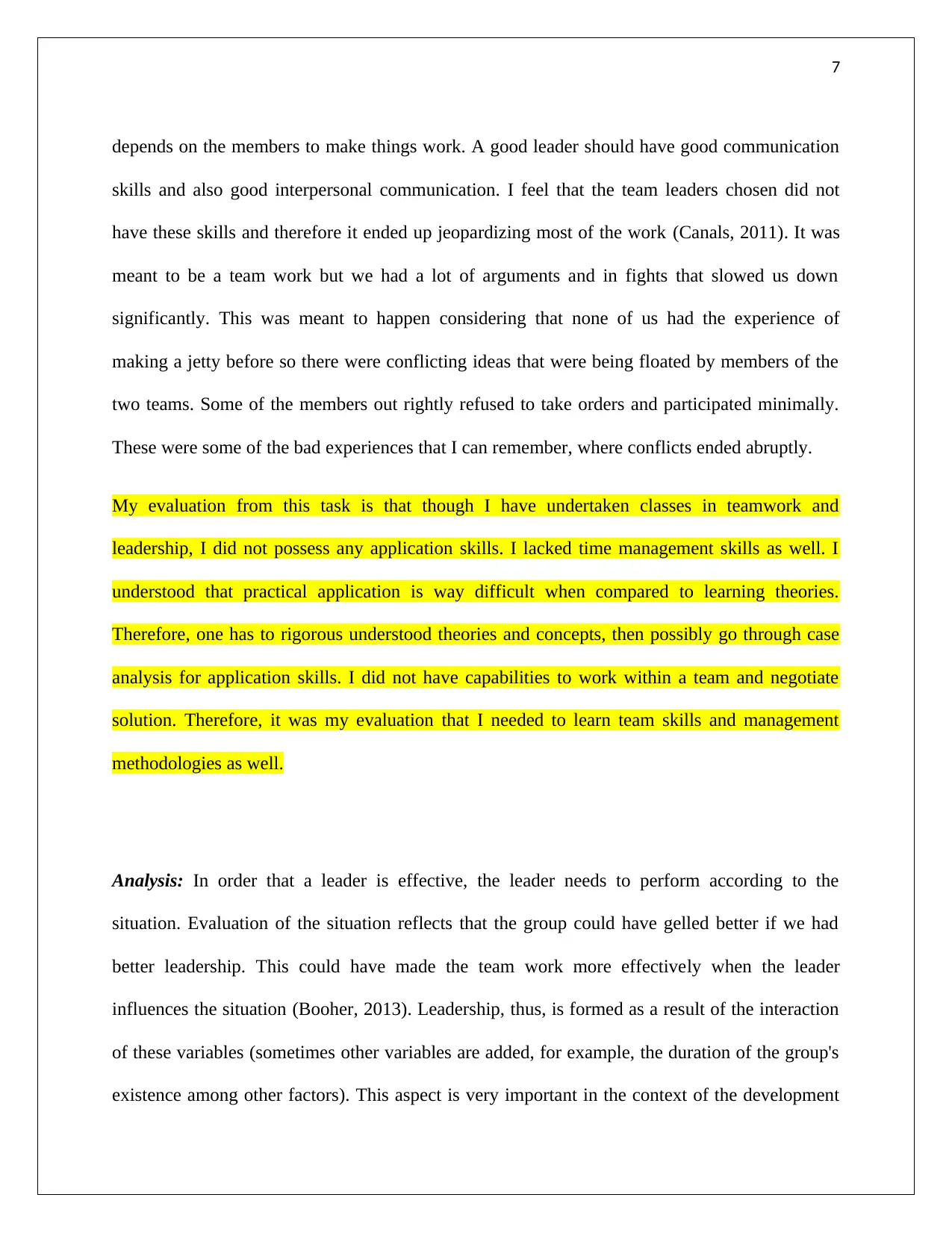
7
depends on the members to make things work. A good leader should have good communication
skills and also good interpersonal communication. I feel that the team leaders chosen did not
have these skills and therefore it ended up jeopardizing most of the work (Canals, 2011). It was
meant to be a team work but we had a lot of arguments and in fights that slowed us down
significantly. This was meant to happen considering that none of us had the experience of
making a jetty before so there were conflicting ideas that were being floated by members of the
two teams. Some of the members out rightly refused to take orders and participated minimally.
These were some of the bad experiences that I can remember, where conflicts ended abruptly.
My evaluation from this task is that though I have undertaken classes in teamwork and
leadership, I did not possess any application skills. I lacked time management skills as well. I
understood that practical application is way difficult when compared to learning theories.
Therefore, one has to rigorous understood theories and concepts, then possibly go through case
analysis for application skills. I did not have capabilities to work within a team and negotiate
solution. Therefore, it was my evaluation that I needed to learn team skills and management
methodologies as well.
Analysis: In order that a leader is effective, the leader needs to perform according to the
situation. Evaluation of the situation reflects that the group could have gelled better if we had
better leadership. This could have made the team work more effectively when the leader
influences the situation (Booher, 2013). Leadership, thus, is formed as a result of the interaction
of these variables (sometimes other variables are added, for example, the duration of the group's
existence among other factors). This aspect is very important in the context of the development
depends on the members to make things work. A good leader should have good communication
skills and also good interpersonal communication. I feel that the team leaders chosen did not
have these skills and therefore it ended up jeopardizing most of the work (Canals, 2011). It was
meant to be a team work but we had a lot of arguments and in fights that slowed us down
significantly. This was meant to happen considering that none of us had the experience of
making a jetty before so there were conflicting ideas that were being floated by members of the
two teams. Some of the members out rightly refused to take orders and participated minimally.
These were some of the bad experiences that I can remember, where conflicts ended abruptly.
My evaluation from this task is that though I have undertaken classes in teamwork and
leadership, I did not possess any application skills. I lacked time management skills as well. I
understood that practical application is way difficult when compared to learning theories.
Therefore, one has to rigorous understood theories and concepts, then possibly go through case
analysis for application skills. I did not have capabilities to work within a team and negotiate
solution. Therefore, it was my evaluation that I needed to learn team skills and management
methodologies as well.
Analysis: In order that a leader is effective, the leader needs to perform according to the
situation. Evaluation of the situation reflects that the group could have gelled better if we had
better leadership. This could have made the team work more effectively when the leader
influences the situation (Booher, 2013). Leadership, thus, is formed as a result of the interaction
of these variables (sometimes other variables are added, for example, the duration of the group's
existence among other factors). This aspect is very important in the context of the development
Paraphrase This Document
Need a fresh take? Get an instant paraphrase of this document with our AI Paraphraser
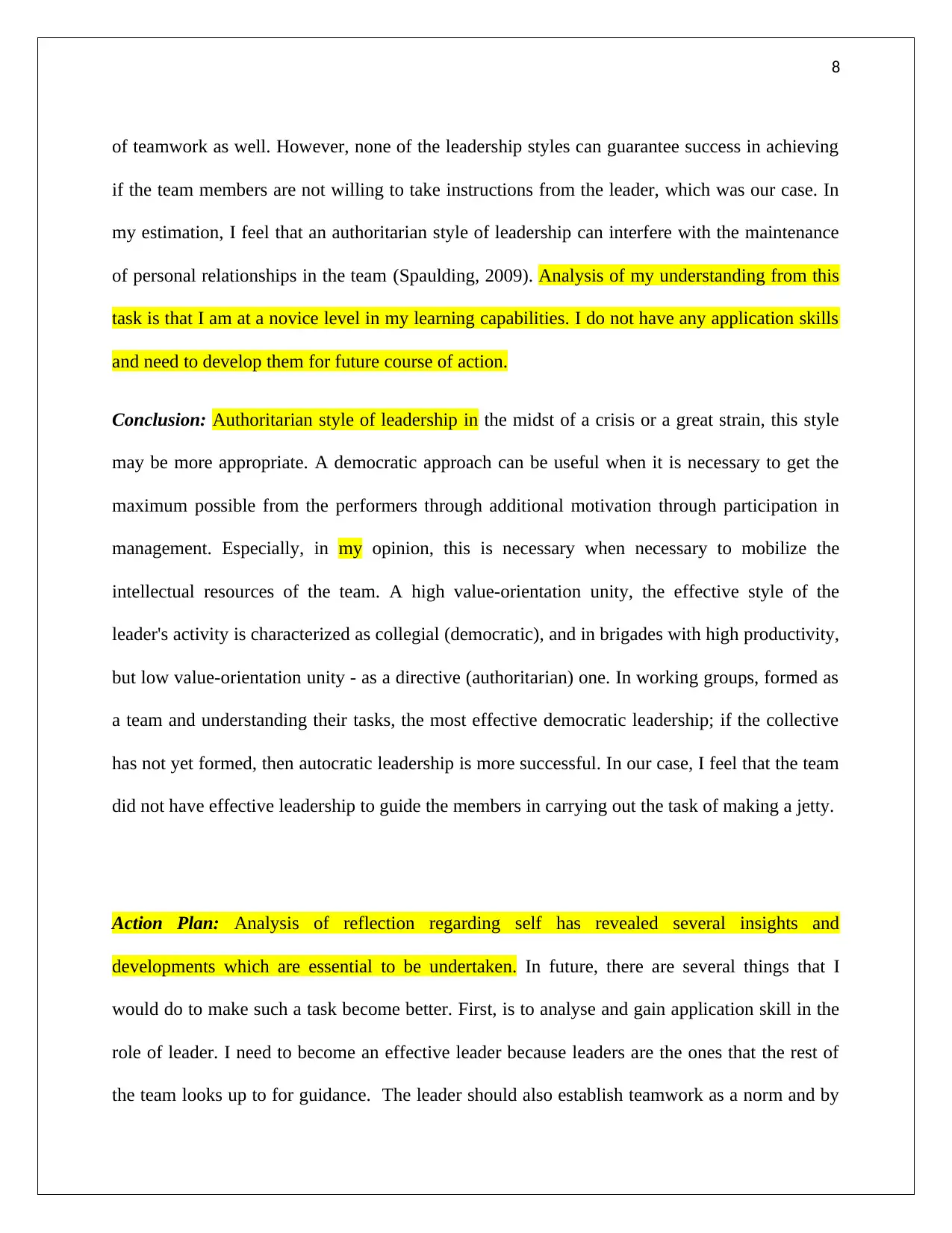
8
of teamwork as well. However, none of the leadership styles can guarantee success in achieving
if the team members are not willing to take instructions from the leader, which was our case. In
my estimation, I feel that an authoritarian style of leadership can interfere with the maintenance
of personal relationships in the team (Spaulding, 2009). Analysis of my understanding from this
task is that I am at a novice level in my learning capabilities. I do not have any application skills
and need to develop them for future course of action.
Conclusion: Authoritarian style of leadership in the midst of a crisis or a great strain, this style
may be more appropriate. A democratic approach can be useful when it is necessary to get the
maximum possible from the performers through additional motivation through participation in
management. Especially, in my opinion, this is necessary when necessary to mobilize the
intellectual resources of the team. A high value-orientation unity, the effective style of the
leader's activity is characterized as collegial (democratic), and in brigades with high productivity,
but low value-orientation unity - as a directive (authoritarian) one. In working groups, formed as
a team and understanding their tasks, the most effective democratic leadership; if the collective
has not yet formed, then autocratic leadership is more successful. In our case, I feel that the team
did not have effective leadership to guide the members in carrying out the task of making a jetty.
Action Plan: Analysis of reflection regarding self has revealed several insights and
developments which are essential to be undertaken. In future, there are several things that I
would do to make such a task become better. First, is to analyse and gain application skill in the
role of leader. I need to become an effective leader because leaders are the ones that the rest of
the team looks up to for guidance. The leader should also establish teamwork as a norm and by
of teamwork as well. However, none of the leadership styles can guarantee success in achieving
if the team members are not willing to take instructions from the leader, which was our case. In
my estimation, I feel that an authoritarian style of leadership can interfere with the maintenance
of personal relationships in the team (Spaulding, 2009). Analysis of my understanding from this
task is that I am at a novice level in my learning capabilities. I do not have any application skills
and need to develop them for future course of action.
Conclusion: Authoritarian style of leadership in the midst of a crisis or a great strain, this style
may be more appropriate. A democratic approach can be useful when it is necessary to get the
maximum possible from the performers through additional motivation through participation in
management. Especially, in my opinion, this is necessary when necessary to mobilize the
intellectual resources of the team. A high value-orientation unity, the effective style of the
leader's activity is characterized as collegial (democratic), and in brigades with high productivity,
but low value-orientation unity - as a directive (authoritarian) one. In working groups, formed as
a team and understanding their tasks, the most effective democratic leadership; if the collective
has not yet formed, then autocratic leadership is more successful. In our case, I feel that the team
did not have effective leadership to guide the members in carrying out the task of making a jetty.
Action Plan: Analysis of reflection regarding self has revealed several insights and
developments which are essential to be undertaken. In future, there are several things that I
would do to make such a task become better. First, is to analyse and gain application skill in the
role of leader. I need to become an effective leader because leaders are the ones that the rest of
the team looks up to for guidance. The leader should also establish teamwork as a norm and by
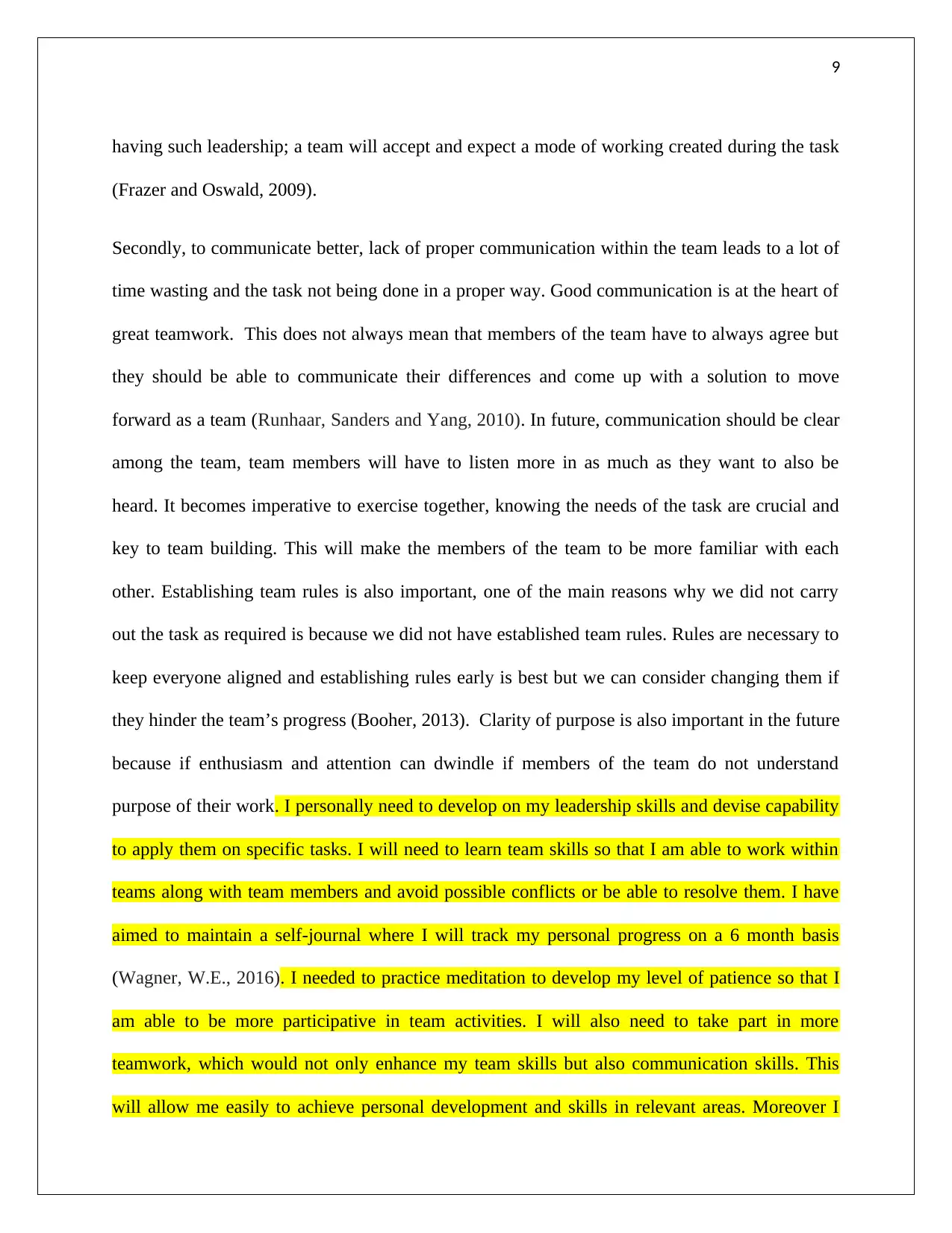
9
having such leadership; a team will accept and expect a mode of working created during the task
(Frazer and Oswald, 2009).
Secondly, to communicate better, lack of proper communication within the team leads to a lot of
time wasting and the task not being done in a proper way. Good communication is at the heart of
great teamwork. This does not always mean that members of the team have to always agree but
they should be able to communicate their differences and come up with a solution to move
forward as a team (Runhaar, Sanders and Yang, 2010). In future, communication should be clear
among the team, team members will have to listen more in as much as they want to also be
heard. It becomes imperative to exercise together, knowing the needs of the task are crucial and
key to team building. This will make the members of the team to be more familiar with each
other. Establishing team rules is also important, one of the main reasons why we did not carry
out the task as required is because we did not have established team rules. Rules are necessary to
keep everyone aligned and establishing rules early is best but we can consider changing them if
they hinder the team’s progress (Booher, 2013). Clarity of purpose is also important in the future
because if enthusiasm and attention can dwindle if members of the team do not understand
purpose of their work. I personally need to develop on my leadership skills and devise capability
to apply them on specific tasks. I will need to learn team skills so that I am able to work within
teams along with team members and avoid possible conflicts or be able to resolve them. I have
aimed to maintain a self-journal where I will track my personal progress on a 6 month basis
(Wagner, W.E., 2016). I needed to practice meditation to develop my level of patience so that I
am able to be more participative in team activities. I will also need to take part in more
teamwork, which would not only enhance my team skills but also communication skills. This
will allow me easily to achieve personal development and skills in relevant areas. Moreover I
having such leadership; a team will accept and expect a mode of working created during the task
(Frazer and Oswald, 2009).
Secondly, to communicate better, lack of proper communication within the team leads to a lot of
time wasting and the task not being done in a proper way. Good communication is at the heart of
great teamwork. This does not always mean that members of the team have to always agree but
they should be able to communicate their differences and come up with a solution to move
forward as a team (Runhaar, Sanders and Yang, 2010). In future, communication should be clear
among the team, team members will have to listen more in as much as they want to also be
heard. It becomes imperative to exercise together, knowing the needs of the task are crucial and
key to team building. This will make the members of the team to be more familiar with each
other. Establishing team rules is also important, one of the main reasons why we did not carry
out the task as required is because we did not have established team rules. Rules are necessary to
keep everyone aligned and establishing rules early is best but we can consider changing them if
they hinder the team’s progress (Booher, 2013). Clarity of purpose is also important in the future
because if enthusiasm and attention can dwindle if members of the team do not understand
purpose of their work. I personally need to develop on my leadership skills and devise capability
to apply them on specific tasks. I will need to learn team skills so that I am able to work within
teams along with team members and avoid possible conflicts or be able to resolve them. I have
aimed to maintain a self-journal where I will track my personal progress on a 6 month basis
(Wagner, W.E., 2016). I needed to practice meditation to develop my level of patience so that I
am able to be more participative in team activities. I will also need to take part in more
teamwork, which would not only enhance my team skills but also communication skills. This
will allow me easily to achieve personal development and skills in relevant areas. Moreover I
⊘ This is a preview!⊘
Do you want full access?
Subscribe today to unlock all pages.

Trusted by 1+ million students worldwide
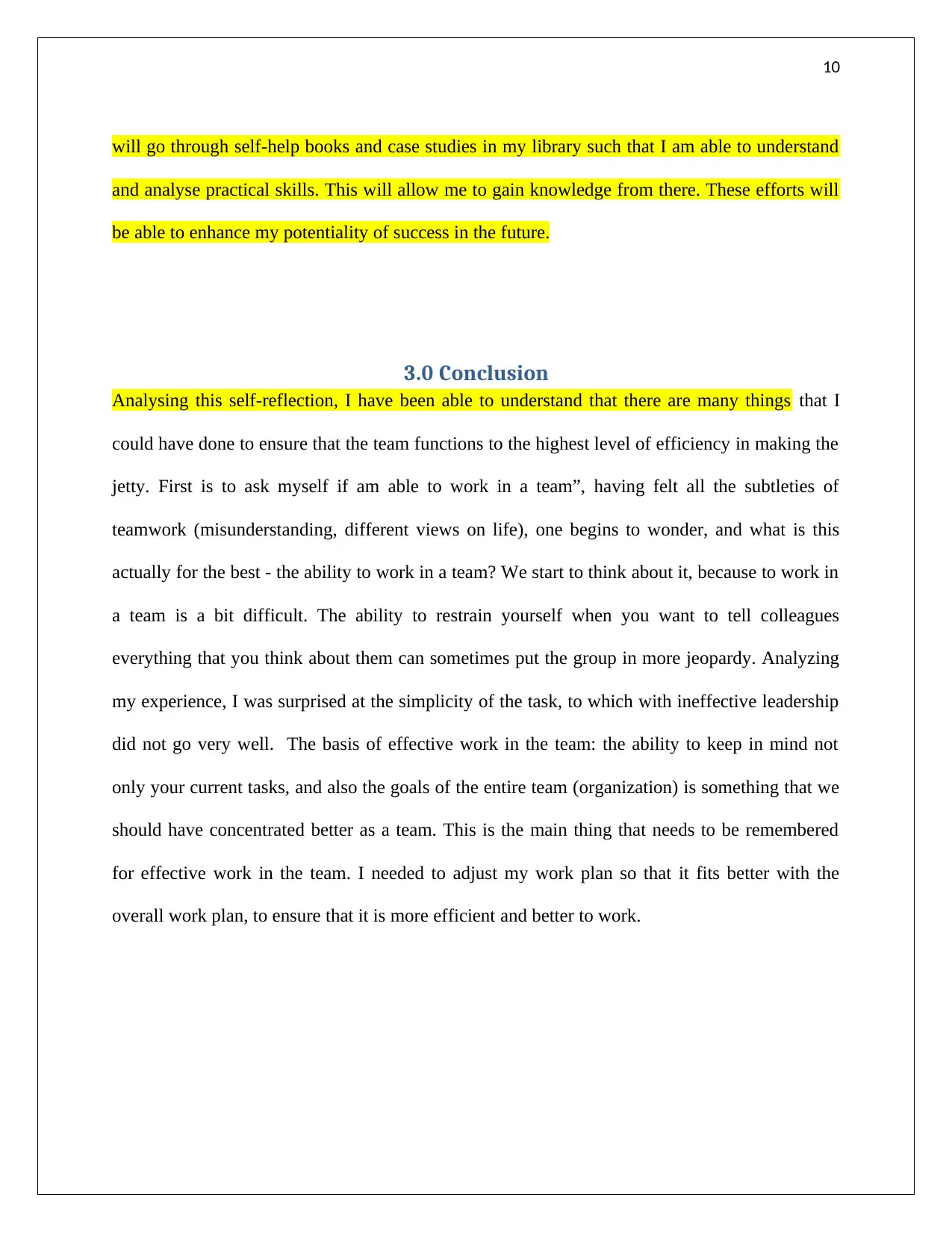
10
will go through self-help books and case studies in my library such that I am able to understand
and analyse practical skills. This will allow me to gain knowledge from there. These efforts will
be able to enhance my potentiality of success in the future.
3.0 Conclusion
Analysing this self-reflection, I have been able to understand that there are many things that I
could have done to ensure that the team functions to the highest level of efficiency in making the
jetty. First is to ask myself if am able to work in a team”, having felt all the subtleties of
teamwork (misunderstanding, different views on life), one begins to wonder, and what is this
actually for the best - the ability to work in a team? We start to think about it, because to work in
a team is a bit difficult. The ability to restrain yourself when you want to tell colleagues
everything that you think about them can sometimes put the group in more jeopardy. Analyzing
my experience, I was surprised at the simplicity of the task, to which with ineffective leadership
did not go very well. The basis of effective work in the team: the ability to keep in mind not
only your current tasks, and also the goals of the entire team (organization) is something that we
should have concentrated better as a team. This is the main thing that needs to be remembered
for effective work in the team. I needed to adjust my work plan so that it fits better with the
overall work plan, to ensure that it is more efficient and better to work.
will go through self-help books and case studies in my library such that I am able to understand
and analyse practical skills. This will allow me to gain knowledge from there. These efforts will
be able to enhance my potentiality of success in the future.
3.0 Conclusion
Analysing this self-reflection, I have been able to understand that there are many things that I
could have done to ensure that the team functions to the highest level of efficiency in making the
jetty. First is to ask myself if am able to work in a team”, having felt all the subtleties of
teamwork (misunderstanding, different views on life), one begins to wonder, and what is this
actually for the best - the ability to work in a team? We start to think about it, because to work in
a team is a bit difficult. The ability to restrain yourself when you want to tell colleagues
everything that you think about them can sometimes put the group in more jeopardy. Analyzing
my experience, I was surprised at the simplicity of the task, to which with ineffective leadership
did not go very well. The basis of effective work in the team: the ability to keep in mind not
only your current tasks, and also the goals of the entire team (organization) is something that we
should have concentrated better as a team. This is the main thing that needs to be remembered
for effective work in the team. I needed to adjust my work plan so that it fits better with the
overall work plan, to ensure that it is more efficient and better to work.
Paraphrase This Document
Need a fresh take? Get an instant paraphrase of this document with our AI Paraphraser
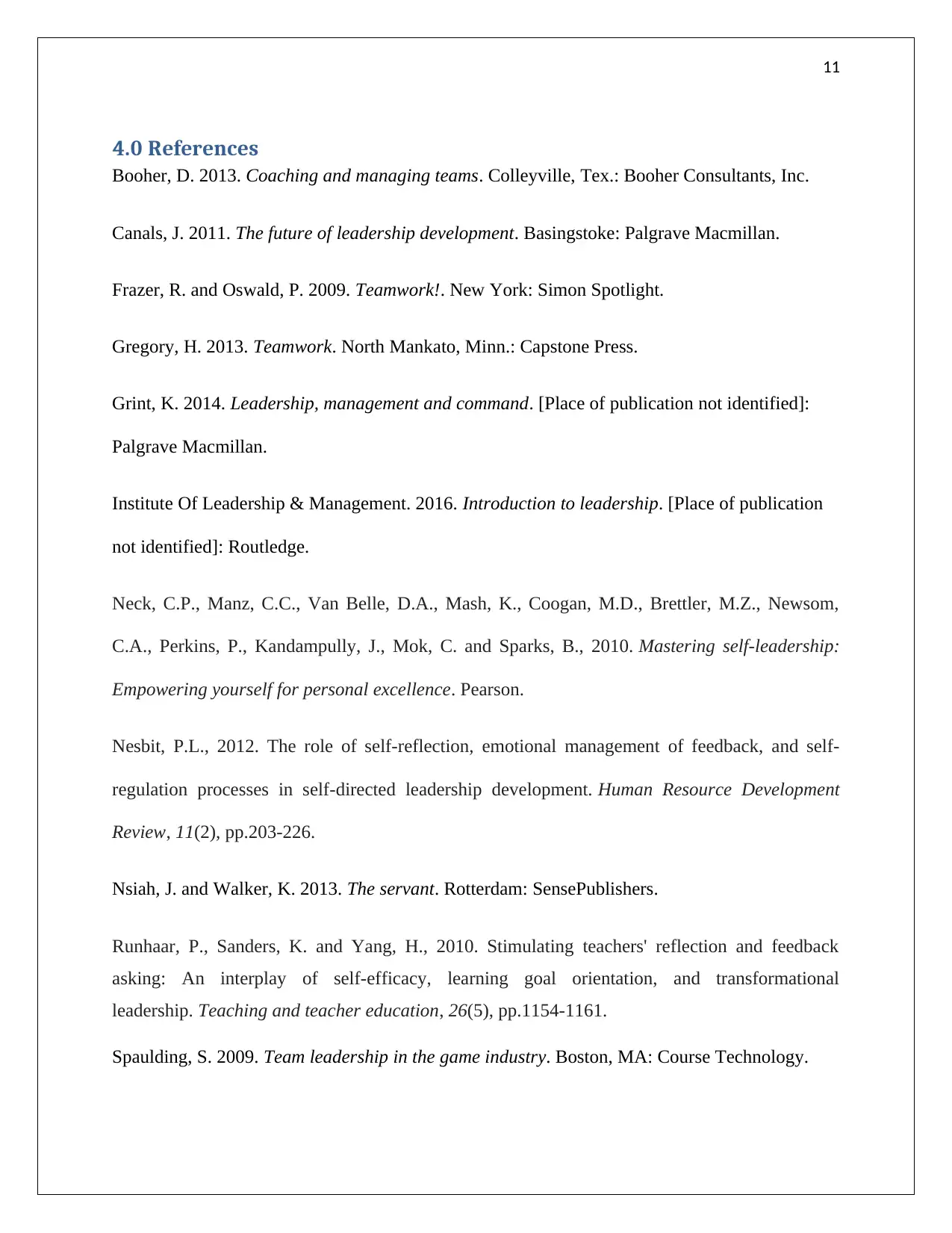
11
4.0 References
Booher, D. 2013. Coaching and managing teams. Colleyville, Tex.: Booher Consultants, Inc.
Canals, J. 2011. The future of leadership development. Basingstoke: Palgrave Macmillan.
Frazer, R. and Oswald, P. 2009. Teamwork!. New York: Simon Spotlight.
Gregory, H. 2013. Teamwork. North Mankato, Minn.: Capstone Press.
Grint, K. 2014. Leadership, management and command. [Place of publication not identified]:
Palgrave Macmillan.
Institute Of Leadership & Management. 2016. Introduction to leadership. [Place of publication
not identified]: Routledge.
Neck, C.P., Manz, C.C., Van Belle, D.A., Mash, K., Coogan, M.D., Brettler, M.Z., Newsom,
C.A., Perkins, P., Kandampully, J., Mok, C. and Sparks, B., 2010. Mastering self-leadership:
Empowering yourself for personal excellence. Pearson.
Nesbit, P.L., 2012. The role of self-reflection, emotional management of feedback, and self-
regulation processes in self-directed leadership development. Human Resource Development
Review, 11(2), pp.203-226.
Nsiah, J. and Walker, K. 2013. The servant. Rotterdam: SensePublishers.
Runhaar, P., Sanders, K. and Yang, H., 2010. Stimulating teachers' reflection and feedback
asking: An interplay of self-efficacy, learning goal orientation, and transformational
leadership. Teaching and teacher education, 26(5), pp.1154-1161.
Spaulding, S. 2009. Team leadership in the game industry. Boston, MA: Course Technology.
4.0 References
Booher, D. 2013. Coaching and managing teams. Colleyville, Tex.: Booher Consultants, Inc.
Canals, J. 2011. The future of leadership development. Basingstoke: Palgrave Macmillan.
Frazer, R. and Oswald, P. 2009. Teamwork!. New York: Simon Spotlight.
Gregory, H. 2013. Teamwork. North Mankato, Minn.: Capstone Press.
Grint, K. 2014. Leadership, management and command. [Place of publication not identified]:
Palgrave Macmillan.
Institute Of Leadership & Management. 2016. Introduction to leadership. [Place of publication
not identified]: Routledge.
Neck, C.P., Manz, C.C., Van Belle, D.A., Mash, K., Coogan, M.D., Brettler, M.Z., Newsom,
C.A., Perkins, P., Kandampully, J., Mok, C. and Sparks, B., 2010. Mastering self-leadership:
Empowering yourself for personal excellence. Pearson.
Nesbit, P.L., 2012. The role of self-reflection, emotional management of feedback, and self-
regulation processes in self-directed leadership development. Human Resource Development
Review, 11(2), pp.203-226.
Nsiah, J. and Walker, K. 2013. The servant. Rotterdam: SensePublishers.
Runhaar, P., Sanders, K. and Yang, H., 2010. Stimulating teachers' reflection and feedback
asking: An interplay of self-efficacy, learning goal orientation, and transformational
leadership. Teaching and teacher education, 26(5), pp.1154-1161.
Spaulding, S. 2009. Team leadership in the game industry. Boston, MA: Course Technology.

12
Wagner, W.E., 2016. Leadership for a better world: Understanding the social change model of
leadership development. John Wiley & Sons.
Wellington, P. 2012. Managing successful teams. London: Kogan Page.
Wagner, W.E., 2016. Leadership for a better world: Understanding the social change model of
leadership development. John Wiley & Sons.
Wellington, P. 2012. Managing successful teams. London: Kogan Page.
⊘ This is a preview!⊘
Do you want full access?
Subscribe today to unlock all pages.

Trusted by 1+ million students worldwide
1 out of 12
Related Documents
Your All-in-One AI-Powered Toolkit for Academic Success.
+13062052269
info@desklib.com
Available 24*7 on WhatsApp / Email
![[object Object]](/_next/static/media/star-bottom.7253800d.svg)
Unlock your academic potential
Copyright © 2020–2026 A2Z Services. All Rights Reserved. Developed and managed by ZUCOL.





